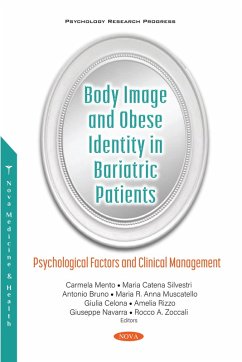
Body Image and Obese Identity in Bariatric Patients: Psychological Factors and Clinical Management (eBook, PDF)

PAYBACK Punkte
38 °P sammeln!
Obesity is a chronic medical disorder which derives from complex interactions of genetic, environmental, neuroendocrinological, psychosocial and behavioural factors. In recent years, the number of cases of obesity has exponentially increased, with approximately 600 million people worldwide currently classified as obese. Bariatric surgery has become one of the main methods of weight loss, being associated with higher long-term weight loss in comparison to conventional treatments, as well as lower risk of disease and a reduction of general mortality. However, obesity has also emotional costs: ma...
Obesity is a chronic medical disorder which derives from complex interactions of genetic, environmental, neuroendocrinological, psychosocial and behavioural factors. In recent years, the number of cases of obesity has exponentially increased, with approximately 600 million people worldwide currently classified as obese. Bariatric surgery has become one of the main methods of weight loss, being associated with higher long-term weight loss in comparison to conventional treatments, as well as lower risk of disease and a reduction of general mortality. However, obesity has also emotional costs: many candidates for bariatric surgery suffer from mental health disorders, in particular depression and binge eating disorders. These disorders are strictly connected to self-representation and body image, which are both complementary to identity. Body image as a multidimensional construct encompasses perceptions about body size, emotions, and cognition about physical appearance as well as attitudes to control body shape. In many cases, post-obese people are still not satisfied with their physical appearance and frequently request further plastic surgery intervention. These results suggest that obese identity remains unchanged after surgery, and that overweight people have difficulties in building a new mental representation as thin, and not as ex-obese. The aim of this book is to describe the role of body image and obese identity in bariatric patients, and discuss how to treat these patients from a psychological point of view.
Dieser Download kann aus rechtlichen Gründen nur mit Rechnungsadresse in A, B, BG, CY, CZ, D, DK, EW, E, FIN, F, GR, HR, H, IRL, I, LT, L, LR, M, NL, PL, P, R, S, SLO, SK ausgeliefert werden.













